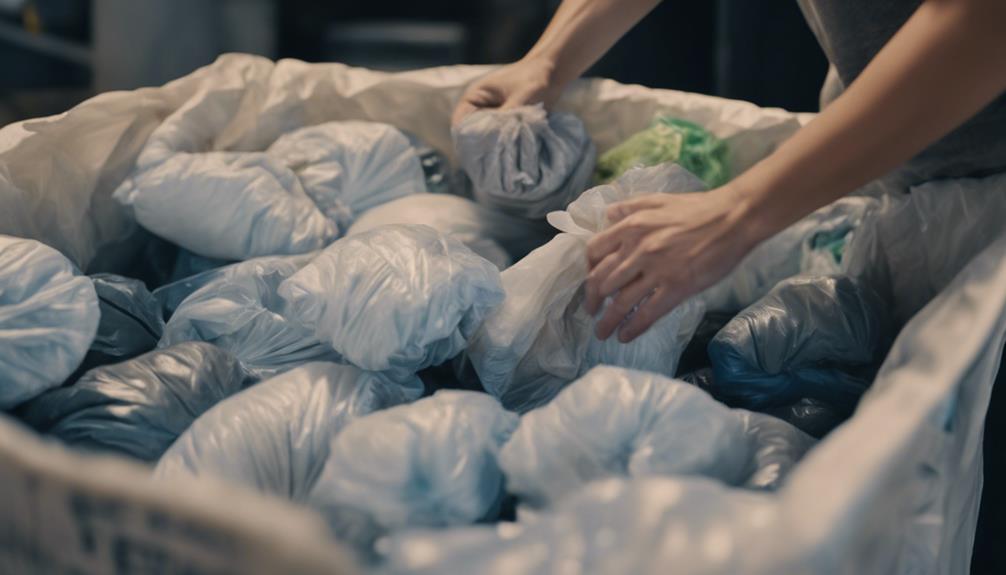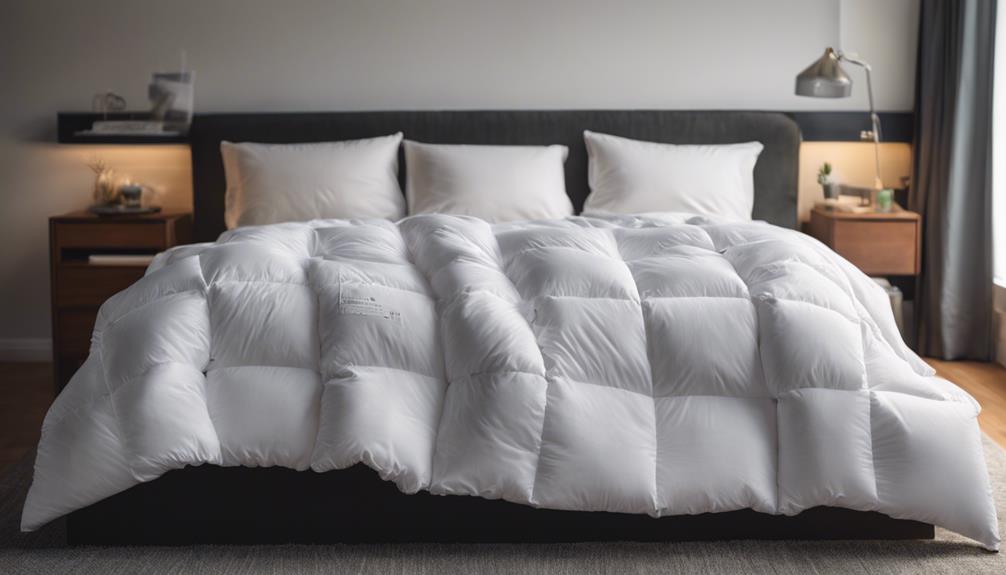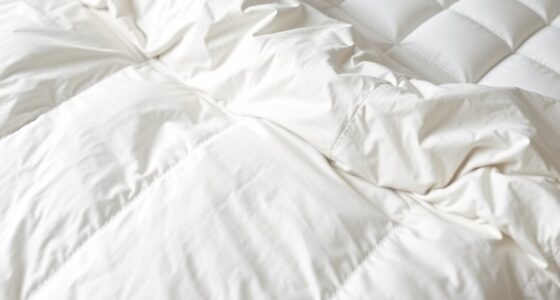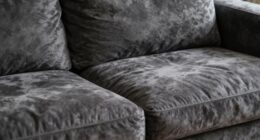Yes, you can recycle a down comforter. Recycling a down comforter promotes sustainability, reduces waste, and supports eco-friendly living. By reaching out to Allied Feather and Down in Montebello, California, you can receive a discount on new sustainable bedding while helping divert waste from landfills and decrease your carbon footprint. Recycling down comforters also helps conserve natural resources, minimize energy consumption, and lower greenhouse gas emissions. This eco-conscious decision contributes to a circular economy and supports responsible consumption practices. Embracing down comforter recycling is a significant step towards a greener future.
Key Takeaways
- Contact local recycling centers for down comforter recycling options.
- Consider repurposing down comforters for DIY projects.
- Donate to shelters or organizations for reuse if recycling isn't possible.
- Explore professional recycling services like ALLIED FEATHER for efficient disposal.
- Ensure environmental sustainability by choosing eco-friendly disposal methods.
Benefits of Recycling Down Comforters
Recycling down comforters plays a vital role in reducing waste in landfills and promoting environmental sustainability. Repurposing old down bedding is a sustainable practice that helps conserve natural resources and lessens the demand for new materials.
By recycling down comforters, we actively contribute to the circular economy by extending the lifecycle of these bedding products. This process not only benefits the environment but also supports the creation of new sustainable items.
The practice of properly recycling down comforters can lead to the development of innovative products that align with eco-friendly principles. As individuals engage in recycling their down bedding, they play an important part in reducing their carbon footprint and overall environmental impact.
Through sustainable practices like recycling down comforters, we can make a significant difference in promoting a healthier planet for current and future generations.
Environmental Impact of Down Comforter Recycling
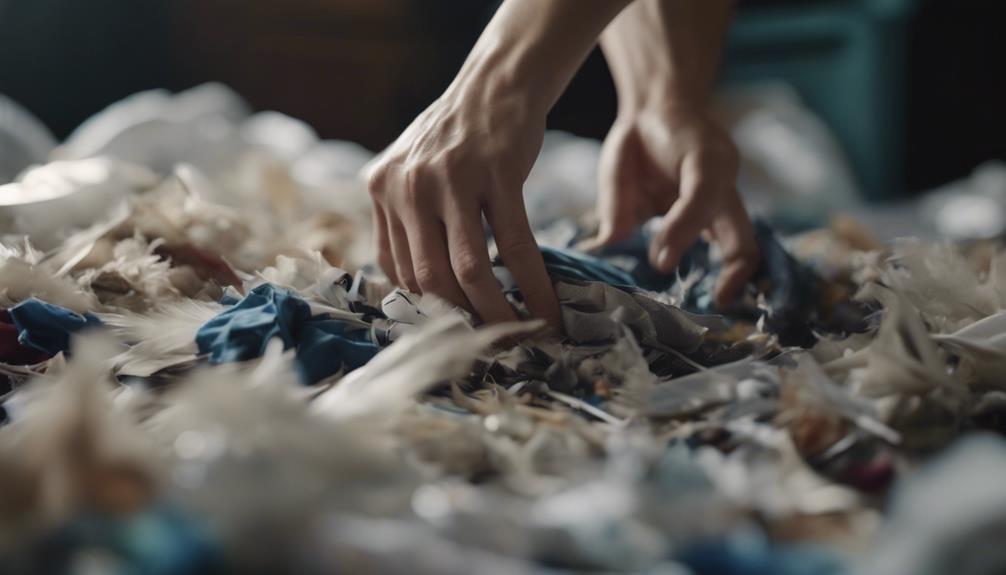
Recycling down comforters has a positive environmental impact by reducing waste in landfills and conserving natural resources through product lifecycle extension.
This process helps lower energy consumption and greenhouse gas emissions by reducing the need for new materials.
Proper disposal of down bedding through recycling supports sustainability efforts and minimizes environmental impact.
Down Comforter Recycling Process
In our efforts to reduce waste and support environmental sustainability, we explore the down comforter recycling process and its environmental impact.
When dealing with old down bedding items, reaching out to Allied Feather and Down in Montebello, California is essential to kickstart the recycling process.
Properly recycled down comforters can even earn you a discount code for new sustainable bedding from DownLinens.com, promoting a circular economy and responsible consumption practices.
By recycling down comforters, we not only divert waste from landfills but also contribute to a more environmentally conscious way of living.
This process aligns with our goal of reducing our carbon footprint and preserving the planet for future generations.
Benefits of Recycling
Opting to repurpose old bedding items like a worn-out comforter not only reduces waste in the environment but also actively contributes to promoting a circular economy in the bedding industry.
Recycling down comforters helps minimize the demand for new materials, thereby reducing the overall environmental impact. By participating in down comforter recycling initiatives and taking them to designated recycling centers, you support responsible consumption and production practices.
This, in turn, contributes to environmental sustainability and encourages more sustainable efforts within the bedding industry. Additionally, engaging in down comforter recycling can lead to incentives and benefits that further promote eco-friendly practices.
Sustainable Down Alternatives
Choosing sustainable down alternatives instead of traditional down comforters can greatly reduce the environmental impact of bedding materials. By opting for new down bedding products made from recycled materials or ethically sourced down, consumers can support responsible consumption practices. Partnering with a sustainable bedding partner guarantees that the materials used are eco-friendly and promote a circular economy. This proactive approach not only minimizes waste but also contributes to global efforts in sustainability. When considering purchasing bedding items, individuals can make a significant difference by selecting sustainable options that prioritize environmental consciousness.
| Benefits of Sustainable Down Alternatives |
|---|
| Minimizes environmental impact |
| Supports responsible consumption practices |
| Contributes to global sustainability efforts |
Steps to Recycle a Down Comforter
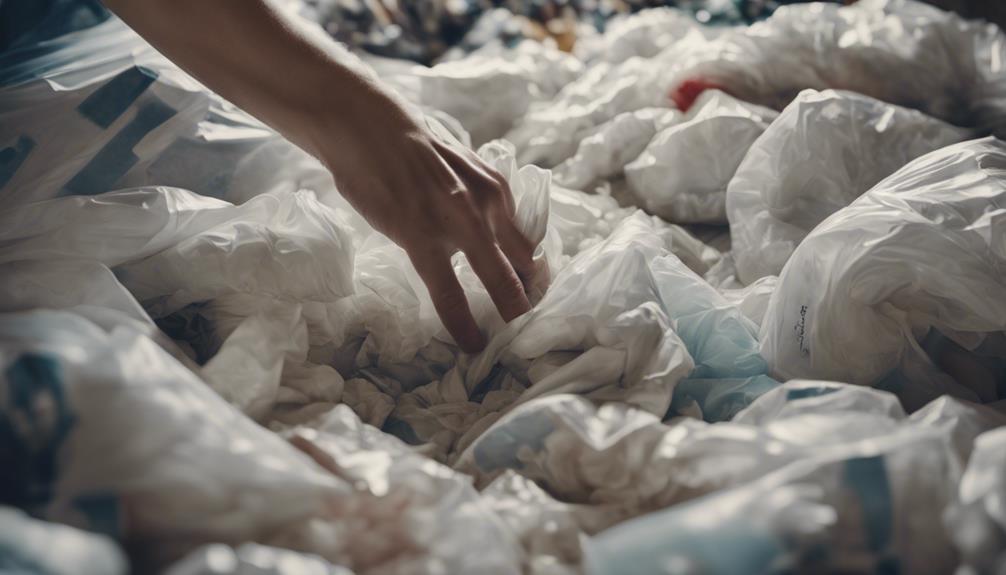
When looking to recycle a down comforter, start by researching local recycling centers or programs that accept these items for eco-friendly disposal.
Check with your state's environmental protection division to explore specific recycling programs available for down comforters in your area.
Considering the down comforter recycling process can lead to sustainable choices for proper disposal.
Down Comforter Recycling Process
To recycle a down comforter, start by contacting ALLIED FEATHER in Montebello, California, a facility specializing in sustainable Down and Feather product recycling. Check the law label to confirm if your comforter is suitable for recycling.
By communicating with ALLIED FEATHER, you can kickstart the recycling process and contribute to environmental sustainability. Remember, after recycling your old products, you can receive a discount code for new down bedding from DownLinens.com. It's a simple way to make certain your down comforter is disposed of responsibly while also benefiting from a discount on your next purchase.
Get in touch with ALLIED FEATHER today to make a positive impact on the environment through proper down comforter recycling.
Eco-Friendly Disposal Options
Exploring eco-friendly disposal options for recycling a down comforter is crucial. When considering what to do with an old comforter, selecting environmentally responsible methods is key. Here are some steps to help recycle your comforter:
- Check with your local environmental protection division for recycling options.
- Look for textile recovery programs in your state like those in Massachusetts.
- Find nearby recycling centers that accept old comforters for proper disposal.
Materials Needed for Down Comforter Recycling
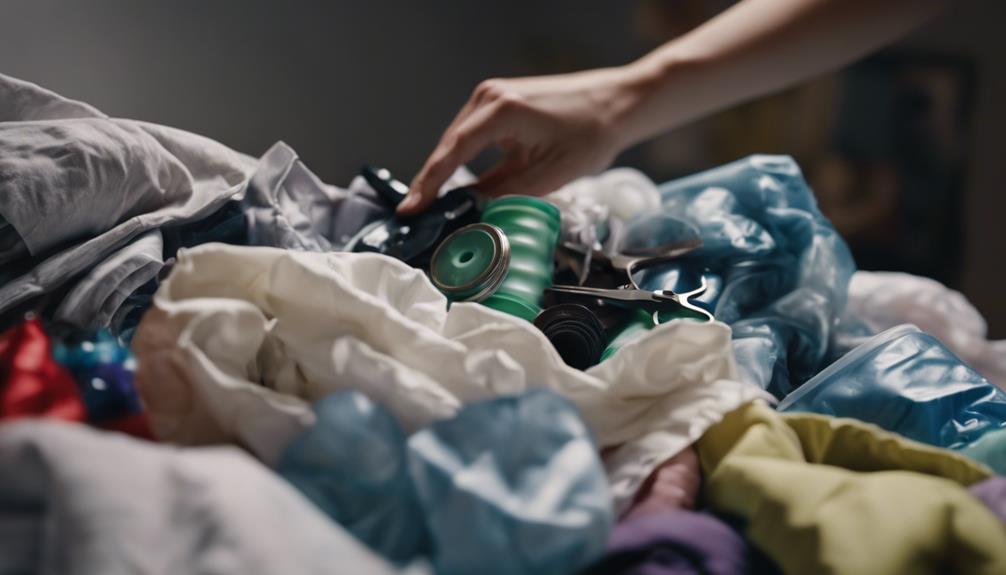
For down comforter recycling, gathering old down bedding products and engaging with recycling facilities are crucial steps in the process. Old bedding is made of materials that can be repurposed and recycled to reduce waste and promote sustainability in the bedding industry.
When considering recycling a down comforter, it's vital to provide your old down bedding products to facilities like ALLIED FEATHER that specialize in handling these materials. By communicating with recycling facilities and following their guidelines, you can guarantee the proper recycling of your down comforter.
This process not only helps support a circular economy by reusing materials but also contributes to reducing the environmental impact of bedding waste. Contacting ALLIED FEATHER for guidance on how to recycle your down comforter is a proactive step towards promoting eco-friendly practices in the bedding industry.
Where to Recycle Down Comforters
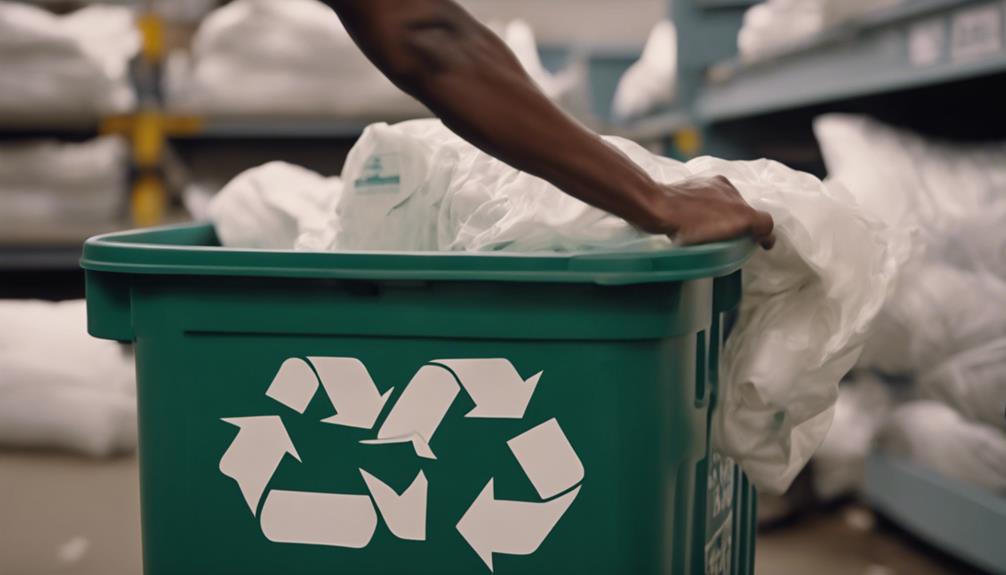
When searching for places to recycle down comforters, consider checking with local municipalities or environmental protection divisions for available programs in your region. Some municipalities offer recycling options for down comforters, but availability varies by region. Check with your state's environmental protection division for specific recycling programs for textiles like comforters. States like Massachusetts have established textile recovery programs for used textiles, including comforters. Look for nearby recycling centers or programs that accept down comforters for proper disposal. Research similar recycling initiatives in your state or county to find suitable options for recycling down comforters.
Contact local recycling centers for information on down comforter recycling.
Explore online resources for eco-friendly disposal options in your area.
Join community groups or forums to exchange ideas on sustainable bedding disposal methods.
Donating Vs. Recycling Down Comforters
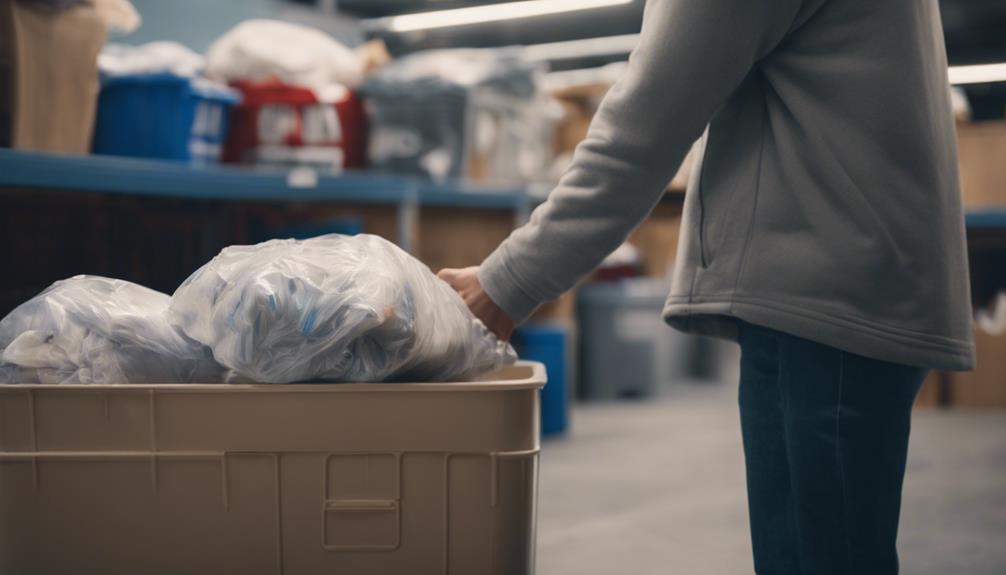
When deliberating between donating or recycling down comforters, it's important to ponder the benefits each option offers.
Donating old comforters can directly help those in need, while recycling them reduces waste and supports sustainability efforts.
Donation Benefits Communities
Donating old down comforters offers a meaningful way to support communities in need during challenging weather conditions. By choosing donation over recycling, we can make a direct impact on people's lives and contribute to a more sustainable future.
Here are three ways donating down comforters benefits communities:
- Provides warmth and comfort to individuals facing cold weather.
- Supports local shelters and organizations helping those in need.
- Promotes a sense of community and solidarity during difficult times.
Recycling Reduces Waste
Recycling down comforters reduces waste and promotes sustainability, offering a more environmentally friendly alternative compared to donation. When we recycle a down comforter, we help minimize the environmental impact by keeping materials out of landfills.
By repurposing the down filling, we contribute to a circular economy where resources are reused efficiently. Choosing to recycle old down comforters also reduces the demand for new materials, which conserves natural resources.
While donating down comforters can benefit those in need, recycling them has a broader positive impact on both the environment and society. Opting for recycling over donation when it comes to down comforters is a proactive step towards reducing waste and promoting a more sustainable future.
Environmental Impact Considered
Considering the environmental impact, repurposing old down comforters offers a sustainable solution that benefits both society and the planet. Donating old down comforters can provide warmth to those in need, especially during harsh weather conditions. Recycling a down comforter helps reduce waste by repurposing materials, supporting sustainability efforts.
Donating these comforters can make a significant impact on the environment and society, ensuring that resources are utilized effectively. Recycling down comforters also plays an important role in environmental conservation by decreasing the demand for new materials. By considering the impact of repurposing old down comforters, we can contribute to reducing waste and promoting sustainable practices for a better future.
DIY Down Comforter Recycling Techniques
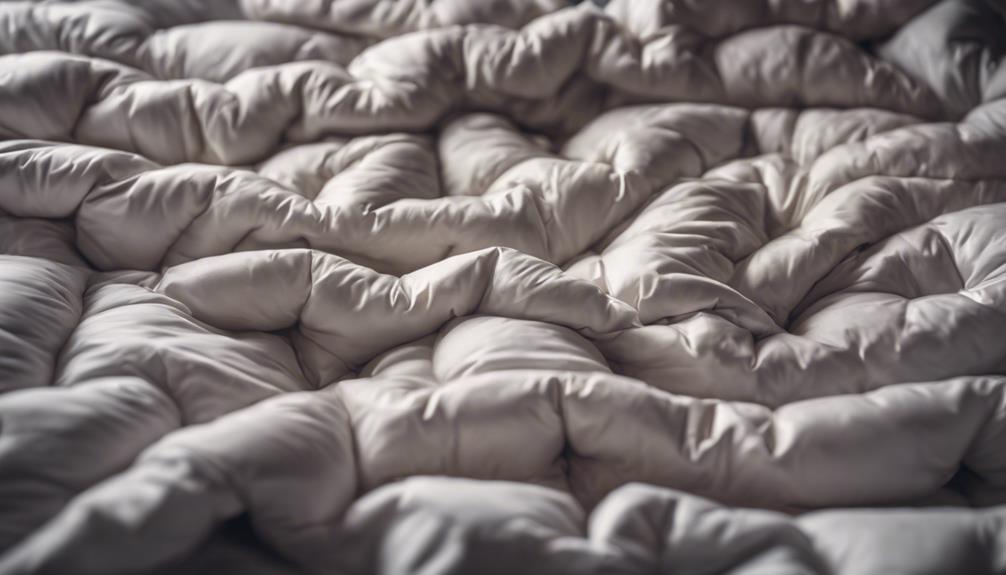
We can repurpose old down comforters in various creative ways to reduce waste and give them a new purpose. Instead of throwing away old bedding, consider cutting down comforters into rags for cleaning around the house.
The down feathers can also be utilized in compost to promote sustainability and reduce waste. For a fun twist, repurpose old down comforters for kids' playrooms as fort material or enhance your pets' bedding area for extra comfort.
Additionally, get creative by using the down filling to create capes, costumes, or as insulation for curtains. These DIY techniques not only help in recycling old bedding but also provide new and innovative ways to use down comforters, giving them a second life beyond the bedroom.
Professional Down Comforter Recycling Services
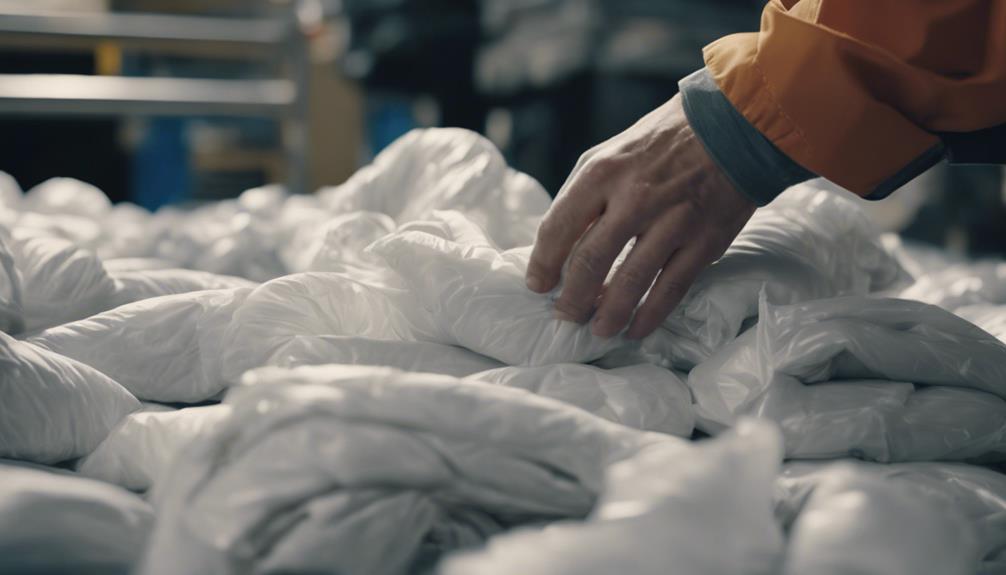
After exploring DIY down comforter recycling techniques, a convenient option for repurposing old bedding is to utilize professional down comforter recycling services offered by ALLIED FEATHER in Montebello, California. By opting for professional services, you can guarantee that your old down comforter is recycled effectively, reducing waste and supporting environmental sustainability.
Here are a few key points to take into account when choosing to recycle your down comforter with ALLIED FEATHER:
- Trust in the expertise of ALLIED FEATHER to manage the recycling process efficiently and responsibly.
- Feel good about contributing to a circular economy by recycling your old down comforter with a dedicated company like ALLIED FEATHER.
- Take advantage of the discount code for new down bedding from DownLinens.com that you'll receive after recycling with ALLIED FEATHER.
Contact ALLIED FEATHER today to initiate the down comforter recycling process and make a positive impact on the environment.
Upcycling Ideas for Old Down Comforters

Repurposing old down comforters offers a sustainable solution to reduce waste and give them a new purpose. Upcycling these comforters can be a creative way to benefit the environment. One idea is to repurpose them into items like doormats, mattress pads, or pet bedding. These new uses not only extend the lifespan of the comforters but also provide comfort in various ways.
Another upcycling idea is to utilize old down comforters for gardening purposes. They can be used as protective covers for plants during colder seasons or even as padding for kneeling while gardening. Additionally, old down comforters can also be repurposed as animal shelters. Animal shelters can benefit from the warmth and comfort these comforters provide to the animals in need.
Tips for Extending the Lifespan of Recycled Down Comforters
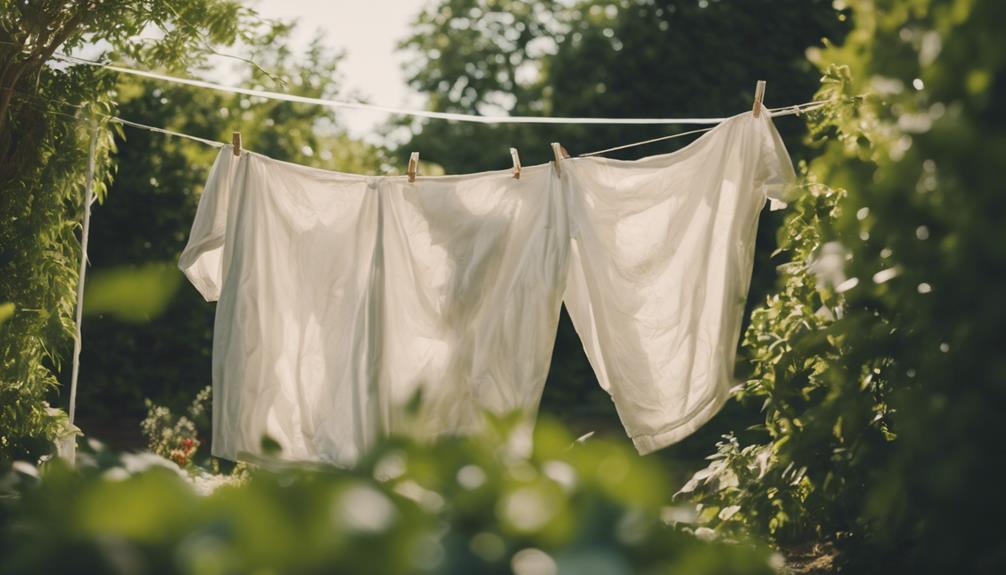
To enhance the durability of recycled down comforters, proper maintenance practices play an essential role in preserving their quality and insulation properties. To extend the lifespan of these products, we need to follow these simple tips:
- Regular Fluffing: By regularly fluffing and airing out your comforter, you can help maintain its loft and insulation properties, ensuring it stays cozy and warm for years to come.
- Use a Duvet Cover: Protect your comforter from dirt, oils, and stains by using a duvet cover. This simple step can prolong the usability of your comforter and keep it looking fresh.
- Proper Storage: Storing your comforter in a breathable cotton bag or container can prevent moisture buildup, preserving its quality over time and making sure it remains a cherished part of your bedding collection.
Frequently Asked Questions
Are Down Comforters Recyclable?
Down comforters are recyclable in some areas with textile recycling programs. Check with local centers or environmental divisions for specific options. Some states, like Massachusetts, offer textile recovery programs for down comforters.
Recycling these items reduces waste and supports sustainability. Explore nearby centers for responsible disposal. Recycling down comforters can help the environment and promote a greener future.
How to Get Rid of a Down Comforter?
When looking to get rid of a down comforter, consider donating it to charities like Goodwill or Salvation Army.
Another option is repurposing it for DIY projects such as making pillows or pet bedding.
Some municipalities offer recycling programs for down bedding, so check with local environmental departments.
If you're unable to recycle locally, contact specialized companies like Allied Feather and Down for information on recycling old down comforters.
What to Do With an Old Goose Down Comforter?
When deciding what to do with an old goose down comforter, consider recycling, donating, or repurposing it to reduce waste and promote sustainability.
By cleaning and deodorizing it before donation, we can positively impact those in need. Donating to organizations like Goodwill or Salvation Army can benefit others, while repurposing can lead to creating new items like doormats or mattress pads.
Let's explore these options to avoid simply throwing away our old comforters.
When Should You Throw Away a Down Comforter?
When should we throw away a down comforter?
It's time to replace a down comforter when it loses fluffiness, warmth, and starts showing signs of stains, clumping, or odors.
As down comforters age, they become less effective at regulating temperature and providing comfort. To maintain peak performance, consider replacing them every 10-15 years.
Proper disposal through recycling or donation reduces waste and supports sustainability.
Can I Recycle My Old Down Comforter When I Replace It?
Yes, you can recycle your old down comforter when you replace it. The down comforter replacement frequency depends on the condition and quality of the comforter. When it’s time for a new one, make sure to find a recycling center that accepts bedding materials for proper disposal or recycling.
Conclusion
To sum up, recycling a down comforter is a sustainable choice that benefits the environment.
For instance, Sarah, a high school student, recycled her old down comforter by donating it to a local shelter. This not only helped those in need but also reduced waste in landfills.
By following the steps outlined in this article, you can easily recycle your down comforter and make a positive impact on the planet.
